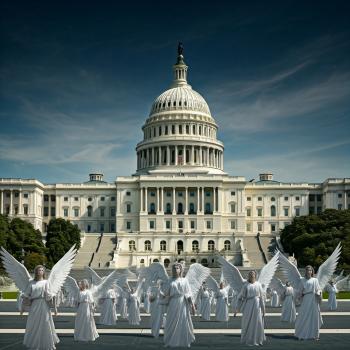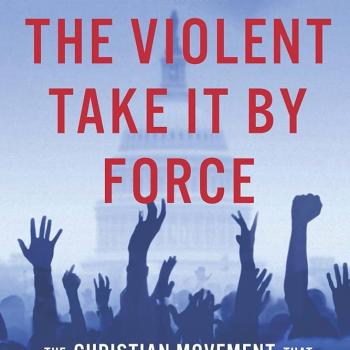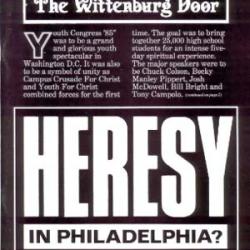I've watched with interest as Stephen Prothero makes the rounds in support of his book — Religious Literacy: What Every American Needs to Know — and Doesn't.
I suppose I will need to read the book, but from what Prothero has said so far in interviews and op-eds, I find I agree with his diagnosis, but disagree with his prescription.
Here's Prothero in The Los Angeles Times:
U.S. citizens know almost nothing about the Bible. Although most regard it as the word of God, few read it anymore. Even evangelicals from the Bible Belt seem more focused on loving Jesus than on learning what he had to say.
In a religious literacy quiz I have administered to undergraduates for the last two years, students tell me that Moses was blinded on the road to Damascus and that Paul led the Israelites on their exodus out of Egypt. Surveys that are more scientific have found that only one out of three U.S. citizens is able to name the four Gospels, and one out of 10 think that Joan of Arc was Noah's wife. No wonder pollster George Gallup has concluded that the United States is "a nation of biblical illiterates."
That Joan of Arc bit is depressing on so many levels — revealing not just biblical illiteracy but ignorance of history, theater, art, spelling and vocabulary.
Prothero's main point is valid. Some basic level of biblical literacy is necessary to appreciate and comprehend what we read from Shakespeare or Abraham Lincoln or Martin Luther King Jr. or "Highway 61 Revisited." And, yes, a shared cultural language makes it easier to talk to one another.
But I'm not nearly as sanguine as Prothero that it is possible to "teach religion" without also "preaching religion." Here is Prothero's proposal:
One solution to this civic problem is to teach Bible classes in public schools. By Bible classes I do not mean classes in which teachers tell students that Jesus loves them or that the Bible is the inerrant word of God, but academic courses that study the Bible's characters and stories as well as the afterlife of the Bible in literature and history. Last week, the Georgia Board of Education gave preliminary approval to two elective Bible courses designed to teach religion rather than preach religion. As long as teachers stick to the curriculum, this is a big step in the right direction.
Prothero's attempted distinction between an "academic" approach to the Bible and a devotional one seems tidy at first glance, but even he is unable to maintain this distinction over the course of a 700-word op-ed. Here's the paragraph immediately preceding the one above:
Biblical illiteracy is not just a religious problem. It is a civic problem with political consequences. How can citizens participate in biblically inflected debates on abortion, capital punishment or the environment without knowing something about the Bible? Because they lack biblical literacy, Americans are easily swayed by demagogues on the left or the right who claim — often incorrectly — that the Bible says this about war or that about homosexuality.
So part of Prothero's supposedly value-neutral, "academic" approach to teaching the Bible will be to clarify, among other things, what the Bible says about war and homosexuality. See if you can figure out a way of doing this that does not involve a public school student's grade depending on the "correct" answer to this question: "True or false? The Mennonites are wrong."
(Somewhere Wendell Berry takes issue with the idea of teaching "the Bible as literature" because he disagrees with what proponents of this idea seem to mean by teaching literature "as literature" — i.e., without regard for whether or not the substance of what it says is true or false.)
I rather doubt, despite Prothero's assurances, that it would be so simple to teach biblical literacy without repeatedly stumbling into questions that would force the teacher and the students to take sides. Consider, for example, the literal crux of the New Testament, the crucifixion of Jesus of Nazareth. Why was Jesus executed? The question is inescapable, and any answer to it is inescapably value-laden and sectarian. That is not a question I am comfortable with Caesar the state providing the official answer for.
(And, no, it wouldn't make any difference if the state allowed me to compose this official answer. Religious liberty does not mean that the official answer should be the "correct" one, or the most popular one held by the majority. Religious liberty means there can be no official answer.)
So while I share Prothero's concern about the lamentable state of biblical literacy, I'm afraid I can't support his proposed solution.
P.S.: While not about "religious literacy" per se, allow me again to recommend How to Be a Perfect Stranger: The Essential Religious Etiquette Handbook. It's a magnanimous and respectful resource for anyone who wishes to be magnanimous and respectful in our increasingly pluralistic society. And if you happen to work on the copydesk of a newspaper, this book will spare you from having to print the kinds of embarrassing corrections that tend to plague religious reporting.















